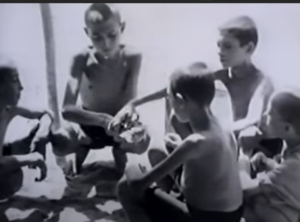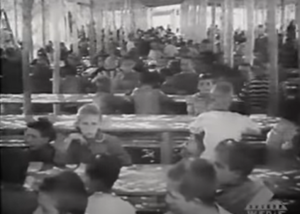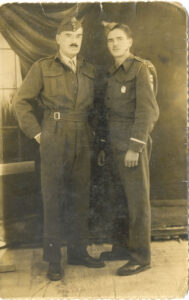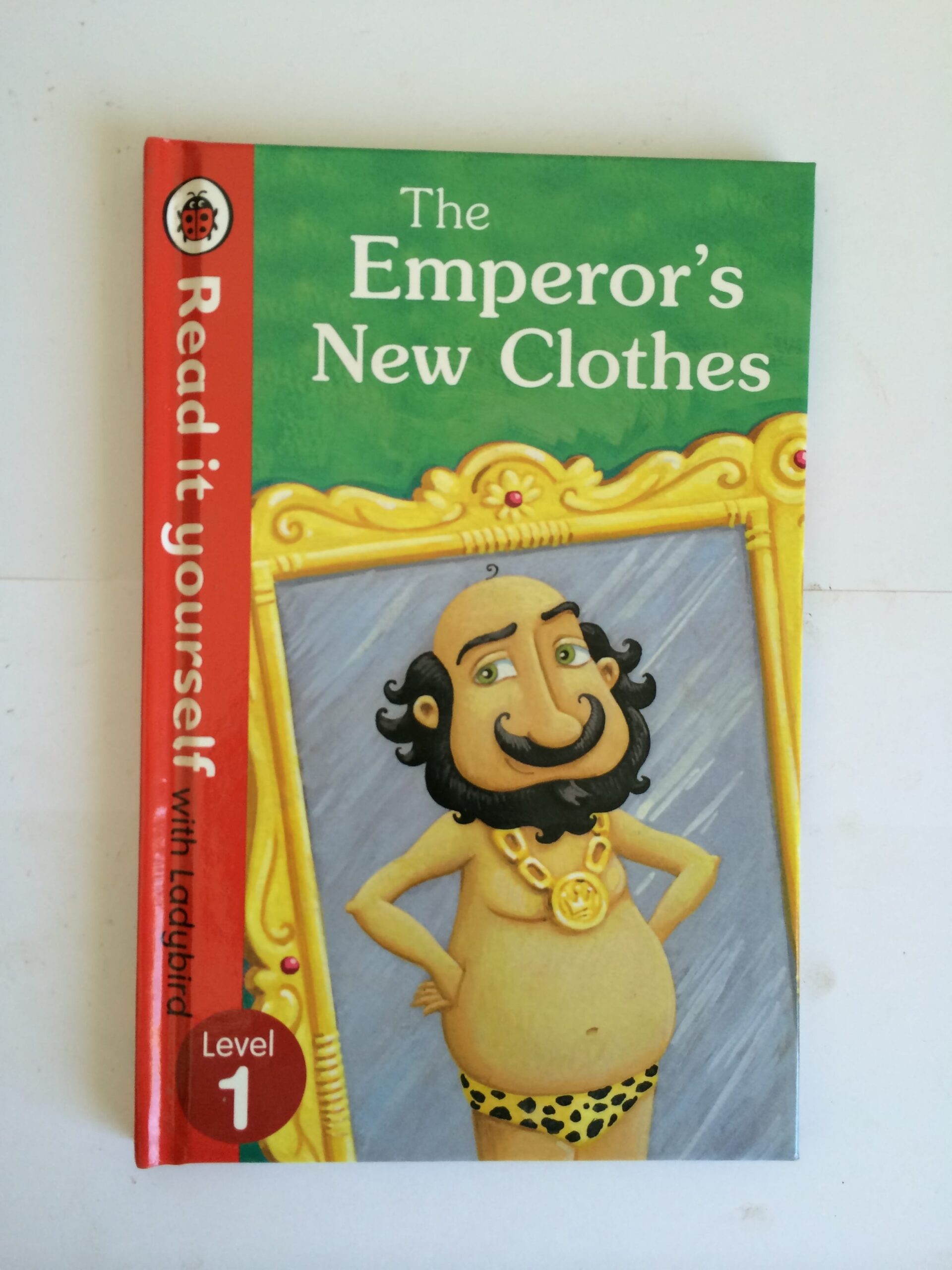During the day we walked up and down the fields and bought eggs and tomatoes very cheaply from the villages. We fried them in our mess tins on campfires and ate them in large quantities. Such rich, fatty food was dangerous for our undernourished bodies and many of our fellow countrymen and women died as a result. By some miracle, we didn’t get ill on this diet.
A little later we were transported to a much prettier spot – the Shah of Persia’s gardens in Teheran. They stretched out in terraces in the midst of luxurious vegetation. But I wasn’t in a state to really appreciate them. Our field kitchen was set up below our tents but in a spot almost as picturesque. It was well-stocked, and the food was very good. We ate a double portion of lamb stew with rice as main course. We also enjoyed daily rations of bread, butter, cheese, sardines, corned beef as well as jam and concentrated milk for our mugs of tea. At last, we were able to have enough to eat, but continued to discreetly conceal dried breadcrusts in our rucksacks just in case we might one day run out of food.
We also visited the civilian camp. It wasn’t as well-situated as ours, but the food was good. I have three photographs of this period – the first ones taken in six months.
We were made to leave the splendid gardens of the Shah of Persia by order of the military. Thus, one fine morning we climbed into big canvas-covered lorries and left for an unknown destination. The month spent in Persia (Iran) had built up our strength a little. We readily ate double rations and carefully kept leftovers, particularly the bread which we then put in our rucksacks.
As we were always hungry, we supplemented our diet with eggs which we bought from the local inhabitants. We hard-boiled them or, even better, scrambled them with tomatoes and cooked them in our army billy-cans on makeshift campfires. We however still remained very thin.
So once more we set off. The Persian landscape was beautiful and unspoilt but we weren’t strong enough yet to look at it and admire it under the welcoming light of freedom. This journey didn’t lack emotion as for example when driving round rocks on narrow roads above sheer drops. Our lorries were driven well by the expert hands of our Persian drivers.
I bought some hot soup in one village and as the lorry left, I carried it in my army mess tin. Unfortunately, I was unable to eat it as I was suddenly overcome by intense shivering. My teeth chattered uncontrollably. It was my first, and happily last, attack of malaria because, believe me, you feel really ill.
On arriving in Baghdad, we were stationed in Nissen-like huts away from the city centre. I and a friend were given permission to visit the city. A small van dropped us off there.
We then hired a horse-drawn carriage. We hadn’t the slightest idea where we were. Gradually we realised we were getting further away from the city centre. It seemed a bit odd to us. We completely panicked when the coachman stopped in front of an oriental style cafe and got down from the carriage. He left it too and complained to a policeman whom we’d been very happy to see nearby. He took charge and spoke to the coachman in his own language.
He then took us back safely to our camp. This Iraqi policeman spoke English and moreover it was obvious he held the Allied army in great respect.
Another visit I remember in his region was to the market. We marvelled at among other things branches full of sun-ripened dates bursting with juice. This land lying between the Tigris and the Euphrates is thought to be The Garden of Eden and there we were, Poles, deported to Siberia and now members of the Polish Army Corps within the British army. The land other than this was desert-like. We were based in the open desert. We no longer had local cooks so we had to do the cooking ourselves. Cauldrons of potatoes which we had peeled were cooked on a primitive oil-fired stove. Flames and black smoke surrounded us and we looked like black devils covered as we were by the sticky layer of soot oil gives off. To get water we had to go down a steep slope to a river 300-500 metres below us. We had to make the same journey to get washed. Sometimes we were so tired that we just collapsed on our mattresses without washing ourselves in order to get some rest and to sleep.
 It was at this time that I first began to learn English. I quickly gave up after looking at a copy of the alphabet. I’d no idea how to pronounce the letters A, B, H, I, K … or where they should be placed or sounded in a word. I was too weak and too tired at that time to make any sustained effort.
It was at this time that I first began to learn English. I quickly gave up after looking at a copy of the alphabet. I’d no idea how to pronounce the letters A, B, H, I, K … or where they should be placed or sounded in a word. I was too weak and too tired at that time to make any sustained effort.
One day I was given permission to visit my brother who was at Officer School several kilometres from our camp. To get to his I used an army lorry which went there from time to time. It was really lovely to see him again. We hadn’t seen each other for several months and this in wartime was very worrying. Moreover I also met several of our friends from school and our neighbourhood at home there. Everyone was so welcoming that we forgot the time when the lorry was due to return.
The last thing one would expect to find in the Iraqi desert was a guest room so we had to improvise. A camp bed was prepared for me in the munitions tent and a sentry stood guard outside. What an honour!
The following day my return home went smoothly. All the same I felt a sudden pang of sorrow for all those young men who were preparing to go to the front. They left almost immediately for Italy and the terrible battle of Monte Cassino.  My brother sadly saw several of his friends killed there. The graves with their names still bear witness today to the role they played in World War II and the price they paid for our freedom.
My brother sadly saw several of his friends killed there. The graves with their names still bear witness today to the role they played in World War II and the price they paid for our freedom.




